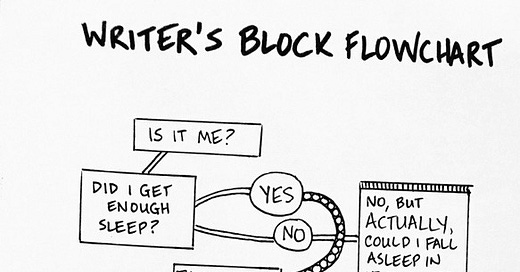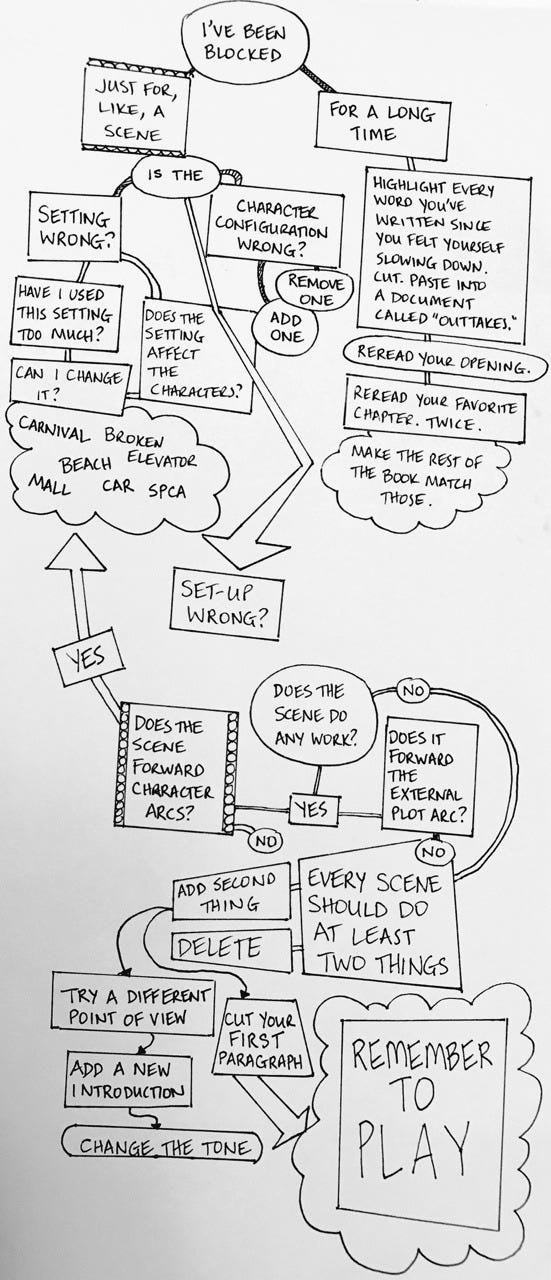Happy holidays! My $50 Home Depot Christmas tree is up, I’ve torn through most of my Advent calendar, and the menorah is ready for more candles. 2022 has been a happily active year for me: I finished Pitch Wars, published three short stories, won a scholarship, attended Viable Paradise, taught some workshops, and sold a short story and a poem and two essays.
The actual writing, though – the act of putting words on a page – that’s felt like a bit of a slog, to be honest. I’m encouraged by Lauren Groff’s recent tweet about “bleak, dry, fallow years”:

At the moment, I’m striving to regain a sense of play and wonder on the page. To that end, I want to share with you a free-form writing flowchart from YA author Maggie Stiefvater, along with the five most exciting, inspiring, or just plain fun books I read this year.
News
On February 9, 2023, I’m teaching a one-hour workshop on submissions tetris.
My horror-leaning Shakespearean sonnet, “Ophelia After Her Distress,” will be published in Shakespeare Unleashed in April 2023 or thereabouts.
My essay “Nostalgia, But Make It Stressful: Fantasy Game As Pressure Valve” will be published in the British Fantasy Society Journal’s Special Issue on Fantasy and Gaming in 2023.
An as-yet-untitled essay on the Pennsylvania Dutch tradition of eating pork and sauerkraut on New Year’s, and my own family’s history with the custom, will be published in Heritage Local, also in 2023.
Maggie Stiefvater’s Writer’s Block Flowchart
As I mentioned in last month’s newsletter, I recently got my hands on a book called Save the Cat! Writes a Novel, and I expected to be talking about that today. But right now I’m in a space where trying to conform to story “rules” feels deleterious rather than beneficial. (This has not always been the case!) Instead, like I said, I’m trying to cultivate a sense of play, to settle into a routine, to hang out with the page and experiment with it without agonizing over what it might look like when I’m done. One resource I like for this is YA novelist Maggie Stiefvater’s Writer’s Block Flowchart.
Stiefvater’s not on the Internet as much as she used to be. (Incidentally, I also find Getting Off The Internet to be beneficial for a writing practice!) But you can still find her flowchart floating around:
When I was in grad school, I even had a poster of this flowchart on the wall of my library carrel. Which is saying something, because space was truly at a premium in there.
What I like about this is that it gives you a couple of different things to try, and almost none of them are “you’re doing it wrong” (even though the middle of the flowchart does say “I actually think I’m doing it wrong”). I also like that this flowchart is grounded in the physical. So much of the time, I find that my boggle is that I’m distracting myself, by being on the Internet or by coming to the page at the end of the day, when my brain is already tired. So: take a nap, or close Twitter, or give yourself a deadline. But sometimes the ideas just won’t gel no matter what you do: then you have to take a walk or read something that inspires you. And sometimes, in fairness, your story actually isn’t working: so add a character, or delete a scene, or try a new point of view, or, or, or, or.
Personally, I’ve been aiming to write in the morning; to allow myself a more stream-of-consciousness style; and to read what I want, instead of what I think I should read.
Books of the Year
This year, I read far fewer new novels than usual. Instead, I read a lot of nonfiction, and I re-read a lot of old favorites. Here are the books that filled me with awe, or made me laugh, or caused me to forget where I was for a few hours at a time.
THE UNWRITTEN BOOK (Samantha Hunt). Memoir. A genre-bending work of nonfiction about ghosts and haunting, except…
…except that the ideas and the language in this book are so recursive, so penetrating, that it's hard for me to even put my finger on what the book is about. In the end I concluded that this is a book of essays about Samantha Hunt's father, but that's like looking at a lemon tree and saying it's an acorn. No matter what it is, though, it made me think differently: about language, about sanity, about personal narrative. I expect to return to it again and again.THE ROBBER BRIDE (Margaret Atwood). Literary fiction. Three women confront their history with a former friend who betrayed them.
Like Taffy Brodesser-Akner’s FLEISHMAN IS IN TROUBLE, this is an incredibly smart book about hetero men and hetero women and how they interface with each other. I love how deftly this book uses point of view (again, like FLEISHMAN!) to make you consider and reconsider what it is you’re looking at, and who’s right and who’s wrong, and whether or not that’s even the question you should be asking in the first place.
I will also take this opportunity to say that I re-read FLEISHMAN for the third time this year, and if it weren’t such an old standby for me, it would be on this list. I’m watching the Hulu adaptation and it’s great.THE CHRONICLES OF CHRESTOMANCI (Diana Wynne Jones). Children’s fantasy. A series of novels about an enchanter in a parallel universe.
I read the first three of these when I was a child, but I never finished the full series until this year. These books are delightful, clever, and almost shockingly British, and the latter two – CONRAD’S FATE and THE PINHOE EGG – turned out, to my surprise, to be the best of the bunch. These might seem like silly little kids’ books, but I had more fun reading them than anything else this year.MISERY (Stephen King). Thriller. A novelist is kidnapped by a fan and has to write a new novel according to her whims, or get murdered. Very Scheherezade.
I’ve read more King than I can count, but I hadn’t read MISERY before. I’ll be honest: Most of Stephen King’s books fall apart for me in the last eighth or so. It’s like he can maintain the tension for only so long, and then the thread snaps and everything flies all over the place and gets ridiculous. But not MISERY. I found MISERY to be tightly plotted, well written, and thematically resonant. What I love most about King is the way he uses genre elements to highlight real-world emotional truths, and MISERY’s truth – about the “redemptive power of writing,” as he says – happened to echo particularly loud.
I also re-read IT. That one’s terrible.FOREVERLAND: ON THE DIVINE TEDIUM OF MARRIAGE (Heather Havrilesky). Memoir. A humorous collection of essays about Havrilesky’s own marriage.
I read a number of reviews of this book that painted Havrilesky as an unlikable, self-absorbed shrew who’s mean to her husband. I think people who read this book and come away with that impression have poor reading comprehension. FOREVERLAND is an honest, exciting, snappily written, smart-as-hell portrayal of a marriage over fifteen years, between two people who totally love and trust and get each other, and also can't stand each other's guts sometimes, but that’s okay, for God's sake, because what else would you expect when you sign up to drag another sentient sack of meat across the surface of the earth until you die?
I’m particularly impressed by the way Havrilesky writes with incisive, impressive clarity about how she felt about things that happened fifteen years ago, because I can’t even remember how I felt this morning.
What are the best books you read this year? Write me back and tell me what to add to my already collapsing TBR!
I hope you all have a gentle, restful end-of-2022, and I’ll see y’all in the New Year.





